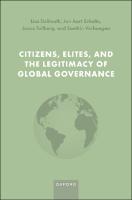Citizens, Elites, and the Legitimacy of Global Governance
Author(s)
Dellmuth, Lisa
Scholte, Jan Aart
Tallberg, Jonas
Verhaegen, Soetkin
Language
EnglishAbstract
Contemporary society has witnessed major growth in global governance, yet the legitimacy of global governance remains deeply in question. This book offers the first full comparative investigation of citizen and elite legitimacy beliefs toward global governance. Empirically, it provides a comprehensive analysis of public and elite opinion toward global governance, building on two uniquely coordinated surveys covering multiple countries and international organizations. Theoretically, it develops an individual-level approach, exploring how a person’s characteristics in respect of socioeconomic status, political values, geographical identification, and domestic institutional trust shape legitimacy beliefs toward global governance. The book’s central findings are threefold. First, there is a notable and general elite–citizen gap in legitimacy beliefs toward global governance. While elites on average hold moderately high levels of legitimacy toward international organizations, the general public is decidedly more skeptical. Second, individual-level differences in interests, values, identities, and trust dispositions provide significant drivers of citizen and elite legitimacy beliefs toward global governance, as well as the gap between the two groups. Most important on the whole are differences in the extent to which citizens and elites trust domestic political institutions, which shape how these groups assess the legitimacy of international organizations. Third, both patterns and sources of citizen and elite legitimacy beliefs vary across organizations and countries. These variations suggest that institutional and societal contexts condition attitudes toward global governance. The book’s findings shed light on future opportunities and constraints in international cooperation, suggesting that current levels of legitimacy point neither to a general crisis of global governance nor to a general readiness for its expansion.
Keywords
global governance, international organizations, legitimacy, confidence, trust, citizens, elites, public opinion, elite opinion, International Criminal Court, International Monetary Fund, United Nations, World Bank, World Health Organization, World Trade OrganizationDOI
10.1093/oso/9780192856241.001.0001ISBN
9780192856241Publisher
Oxford University PressPublisher website
https://global.oup.com/Publication date and place
Oxford, 2022Grantor
Classification
International relations
Political science and theory
Political structure and processes


 Download
Download Web Shop
Web Shop